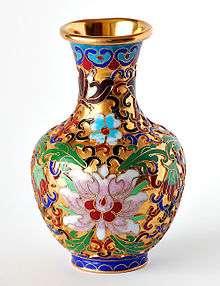Definify.com
Webster 1913 Edition
Vase
Vase
(vās or väz; 277)
, Noun.
1.
A vessel adapted for various domestic purposes, and anciently for sacrificial uses; especially, a vessel of antique or elegant pattern used for ornament;
as, a porcelain
See Illust. of vase
; a gold vase
; a Grecian vase
. Portland vase
, under Portland
. No chargers then were wrought in burnished gold,
Nor silver
Nor silver
vases
took the forming mold. Pope.
2.
(Arch.)
(a)
A vessel similar to that described in the first definition above, or the representation of one in a solid block of stone, or the like, used for an ornament, as on a terrace or in a garden. See Illust. of
Niche
. (b)
The body, or naked ground, of the Corinthian and Composite capital; – called also
tambour
, and drum
. 3.
(Bot.)
The calyx of a plant.
Webster 1828 Edition
Vase
VASE
,Noun.
1.
A vessel for domestic use, or for use in temples; as a vase for sacrifice, an urn, &c.2.
An ancient vessel dug out of the ground or from rubbish, and kept as a curiosity.3.
In architecture, an ornament of sculpture, placed on socles or pedestals, representing the vessels of the ancients, as incensepots, flower-pots, &c. They usually crown or finish facades or frontispieces.4.
The body of the Corinthian and Composite capital; called also the tambor or drum.5.
Among florists, the calyx of a plant, as of a tulip.6.
Among goldsmiths, the middle of a church candlestick.7.
A solid piece of ornamental marble.Definition 2026
Vase
vase
vase
English

A Chinese vase.
Noun
vase (plural vases)
- A container used mainly for displaying fresh, dried, or artificial flowers.
Translations
container used mainly for displaying flowers
|
|
Anagrams
Danish
Etymology
From French vase, from Latin vās (“vessel”).
Pronunciation
- IPA(key): /vaːsə/, [ˈvæːsə]
Noun
vase c (singular definite vasen, plural indefinite vaser)
Declension
Inflection of vase
References
- “vase” in Den Danske Ordbog
French
Pronunciation
- IPA(key): /vaz/
Etymology 1
From Middle French, from Middle Dutch wase (“mud, silt, wet ground, clod of dirt, grass”), from Old Dutch *waso, from Proto-Germanic *wasô (“moisture, ground”), from Proto-Indo-European *wes- (“moist, wet”). More at ouze.
Noun
vase f (plural vases)
Derived terms
Etymology 2
Noun
vase m (plural vases)